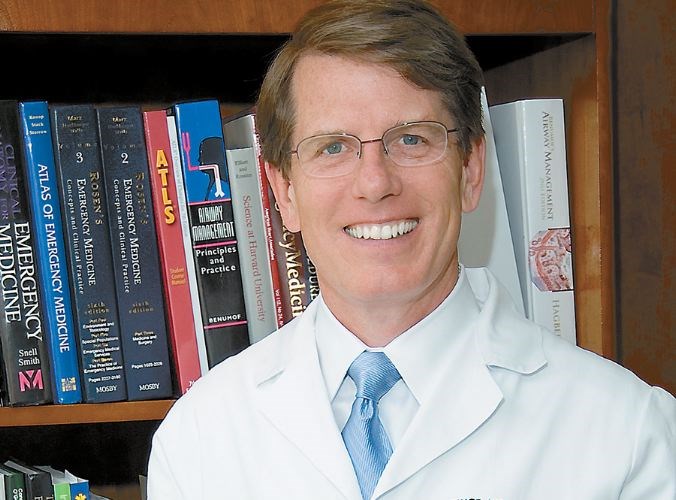When Ron Walls graduated from Prince George secondary school, he had no intention of living anywhere but Prince George upon completion of university.
He never imagined he would be a medical doctor in charge of his own department.
He could scarcely have dreamed he would teach at an Ivy League university.
But all these things have become reality during his distinguished career. Walls is currently based in Boston as director of Brigham and Women's Hospital's emergency medicine department, while also instructing trauma medicine at Harvard University.
You might think that Walls could also not have imagined - as he drove to work Monday morning - that a set of bombs would soon go off at one of the world's most famous sporting events, the Boston Marathon.
You'd would be wrong about that.
For a boy so unaware of his true life's path, the man and the doctor are thorough about preparation for every scenario.
"We have, over the years, done citywide drills where all the trauma centres in the Boston area work together to simulate these sorts of incidents, and plan for the triaging of the potential victims," he said. "In fact, we have done at least one that was specifically for a bomb at a large public gathering. What we never wanted was for one trauma centre to get overwhelmed. We are unique in that we have five major trauma centres within the general Boston area."
Prince George emergency doctors have likely seen many wounds almost exactly like the ones from the marathon blasts, said Walls, but incidents like this are rare for the sheer volume of patients in need of drastic help.
"We get industrial incidents and motor vehicle crashes that generate this type of injury but so many of them, in such a short time, in such young and healthy people, I think that challenges everyone," said Walls.
Twenty-eight of the bombing victims were shipped to his emergency room in the first hour following the blasts. Others followed later.
One of the gratifying things about the response, he said, was the uniformity of care. The last patient through the doors received the same level and intensity of care as the first. Brigham and Women's Hospital has 42 operating rooms, so it wasn't a lack of facilities that might have presented a problem, he said, it was the team surrounding each patient from the ambulance on-scene through to the nurses, ER doctors and all the support staff attached to that. Staff response during the crisis also met the challenge, he said.
The aspects of the mass emergency that have the most need of improvement, he said, was overall co-ordination of resources and the communication systems both internally and out to the public.
For example, he said, he initially told the world that the patients exhibited no sign of shrapnel damage, that the torn flesh was due to common debris projected by the blast. He later had surgeons report to him that indeed bomb-imbedded shrapnel was present in the wounds of the victims.
If there is a positive element to this horror, he said, it was that the Boston area has a large number of resident doctors learning the trauma medicine specialty. Those newly minted doctors got a practical exercise second to nothing a university could conjure, either in the shape and sounds and smells of the wounds or the human dynamics of the workplace under stress.
"Drills and the real thing are radically different," he said.
He also stressed that the best, brightest new medical minds and the veteran operating room staff were equally shocked by the tragedy.
"We started doing debriefing and counselling sessions for our staff Monday evening, believe it or not," Walls said. "Seeing this kind of carnage is traumatic even for experienced emergency specialists. We will continue to do that. And separately we have already begun our analyses so we can know what worked well, what could have been improved. We saw training and theoretical protocols that worked extremely well. We also saw challenges, problems we can solve, ways to improve."
Walls is looking forward to easing his mind back in the simplicity of his friends and family. He maintains close connections to Prince George, including regular Cluculz Lake vacations, but admits it has been more than a year since his last trip here.
"I love my P.G. roots. It's home," he said, before saying he had to go. Along with his administrative duties, he still takes regular hands-on shifts in the emergency room.



